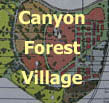|
|
Guest Editorial The CFV Decision: A Shame and a Sham Dennis
Foster |
|
|
|
||
|
The regional forester has issued her decision on the Canyon Forest Village
project, and the chief of the Forest Service has ratified it. To her
credit, this document is written in the first person. She seems quite
willing to acknowledge that the buck stops at her desk. However, the
content of this decision and the basis upon which it was made are
discouraging.
The decision establishes exactly the correct overview to the choices before the Forest Service: doing what is in the "public interest." It's just too bad that this public interest didn't get a more impartial hearing. And, that's because the whole debate over CFV boiled down to one simple, inescapable fact-the Forest Service wants to consolidate its land holdings and will do virtually anything to accomplish this end. In the context of such a public policy decision, what is the public interest? That is a fair question. I have yet to hear a really good answer to that. We live in a world that is beset by scarce resources -- land, labor, water, et al. -- and unlimited desires. Most people would likely agree that our economy should be organized in a way that makes the most of these scarce resources. Such is the result with a market economy. It is not a perfect arrangement, but it has served us well, and you cannot find a better alternative. The absolute foundation for a well-functioning market economy is a set of clear and enforceable property rights. Without these property rights, it is difficult for economic agents to make well-informed decisions. Consequently, the system doesn't function well. In the extreme, it doesn't function at all. Property rights makes the market work, just as gasoline makes a car run. Given that it is important to protect property rights, I would suggest that the public interest is best served by policies that intrude as little as possible on those rights. Wouldn't it be a good idea to apply the Hippocratic Oath -- "First, do no harm" -- to policymakers? To illustrate this more fully, let's review the CFV story. A number of private parcels scattered around the Kaibab National Forest are currently controlled by the CFV developer. Fair enough. I have no problem with that. He has offered to exchange these private parcels for a lesser amount of National Forest land at the boundary of Grand Canyon National Park, upon which CFV will be built. The land given to CFV will be roughly twice the size of Tusayan. CFV will build more hotel rooms than there are in Tusayan, and almost as many as there are in Williams. CFV will be situated at the new transit hub that all future canyon visitors will be forced to use (which Ms. Towns mistakenly believes will improve the quality of the visitor experience). The economic shockwave is likely to stretch from Tusayan to Williams to Flagstaff, all of whom were left out in the cold during the "collaborative" EIS process. The notion that you can acquire worthless property in godforsaken locations for next to nothing and then exchange them for prime real estate next to a national park with a locational advantage over your new-found competition is, well, incredible. The notion that such an exchange is in the "public interest" is indefensible. It is a shame. However, it is even worse. It is an outright sham. The Record of Decision released, for the first time, the appraised value of the inholdings and the 272 acres that would be gained by CFV. Those 272 acres are supposedly worth $5.4 million. That cannot possibly be true. If the Forest Service announced the sale of that much land at the park's boundary for that little money, I suspect the line of potential buyers would be as long as the Colorado River. Consider that last year a study funded by CFV maintained that annual revenues to their venture would quickly reach $160 million per year. Over a 10-year stretch, CFV may make in excess of $1.5 billion. And, the land upon which they sit is worth only $5.4 million? If they were located anywhere else, they probably couldn't make a dime. This conclusion is mind-boggling. This is bad public policy. It might be comic save the potential economic consequences on many business owners in this area. The Forest Service has been driven by their blind desire to consolidate these worthless inholdings. They should have been driven by the public interest. |
||
|
|
||
|
|
||

